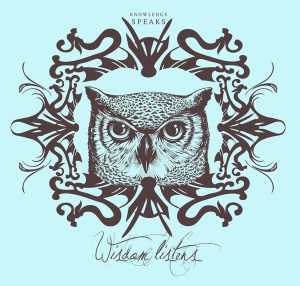They come from miles around, my characters do, traveling the great distance from the fringes of my mind’s eye, some even making the long and arduous haul from my childhood, just to sit and talk. They do this whenever I’m alone.
As they gather ’round, I cast an eye upon their many and various faces and can’t help but feel the slightest twinge of remorse. Being in my company, locked within the confines of my imagination, is not wholly unlike a purgatory for them. A holding pattern, a waiting room, where they converse amongst themselves in voices audible only to myself, trying to catch my attention in the slimmest hope of being set free. Birthed into a story.
Some are fresh meat, the rest lifers, each easily spotted by the differences in their appearance and the strength of their voices. Fresh meats are gossamers—newly formed characters, little more than a stack of traits—who shout in whispers. Lifers, on the other hand, are as fleshed out as you or I, perhaps even more so, who have acquired the proper pitch and turn of phrase to catch me unawares during the times when my mind idles.
Before the talks begin–serious conversation, not the normal natterings they engage in–a flying thing the size of a butterfly, jewel-toned blue stripes, greenish-gold spots, with flecks of silver on the wings, lands in the palm of my outstretched hand.
“What is that then?” a childlike voice asks from somewhere deep in the crowd, low to the ground. I recognize it instantly.
“It’s an anecdote, Duchess. Come see for yourself.” I reply as the creature’s wings beat softly on my palm.
The throng–my personal rogue’s gallery whose roster includes reputables and reprobates alike–part like the Red Sea, making way for the noblest of all serval cats, The Duchess.
“An antidote? Have you been poisoned?” The Duchess queries as she saunters into the open space, a dollop of concern gleaming in her vivid blue eyes.
I try to not laugh, partly out of respect, but mostly due to the fact that though she is the eldest of my unused characters, she is technically still but a kitten. “No, Duchess, it’s an anecdote, as in a short, amusing, or interesting story about a person or an incident.“
“I know full well what an anecdote is, thank you kindly. I was merely attempting to lighten the dreadfully somber mood with a bit of levity.” Not her best faux pas cover, but it was swift, which should count for something. As casually as she could manage, the kitten turned to see if anyone found amusement at her expense. No one did. They knew better. “May I hold it?”
I hesitate and stare at the leapling. Created on February 29th all those many years ago, it was my rationale–on paper–for keeping her a kitten, seeing as she had fewer birthdays, she would naturally age at a decelerated rate. The actuality is I have an affinity for kittens. For full-grown cats? Not so much. And now the dilemma is if her kittenish nature should come into play, and without meaning to, cause injury to the anecdote, then all this would be for naught.
Her eyes plead with all the promise of being good and I have no choice but to relent. “It’s fragile, so be gentle. Take care not to crush it.” I gently place the anecdote in her cupped paws.
“Why does one need an anecdote?” The Duchess of Albion asked, her nose twitching whenever the creature moves its wings.
“To tell a proper story,” I answer. “More than just a sequence of actions, anecdotes are the purest form of the story itself.“
“But I thought characters are at the heart of every great story?“
“They are and anecdotes connect the hearts and minds of those characters to a story.” I try to feign calm but I can see the kitten’s body tensing up. Her eyes, those glorious baby blues, are studying the creature closely. Was I wrong in my decision to trust that she rules her instincts and not the other way around?
“They also add suspense to your story, giving the audience a sense that something is about to happen. If you use them right, you can start raising questions right at the beginning of your story—something that urges your audience to stay with you. By raising a question, you imply that you will provide your audience with the answers. And you can keep doing this as long as you remember to answer all the questions you raise.“
The kitten’s breath becomes rapid and her paws close in around the anecdote and I want to cry out, urge her to stop, but it’s far beyond that point now. She is in control of her own fate. Canines bare themselves, paws pulling the creature closer to her mouth.
“No!” she shakes her head violently. Her ears relax and her mouth closes as her breathing returns to normal. Then, the oddest thing happens…
The Duchess begins to vanish. All the characters look on in dazed silence, uncertain how to react.
“What is happening to me?” she shoots me a panicked glance as cohesion abandons her form.
“Haven’t you sussed it out yet?“
“No… I’m scared!“
“Don’t be,” I smile. “Look around you. You’re at the heart of a story. You’re free.“
“Truly?” she is suddenly overwhelmed with delight, her expression priceless. “But — but what do I do with the anecdote now?”
“Open your paws, let it fly off.”
She unfolds her paws. Tiny wings beat their path to freedom. Then someone from the back of the crowd gives The Duchess a slow clap. Soon, others join in, building into a tidal wave of applause.
The now translucent Duchess waves a tearful thank you to the crowd, before turning back to me with a request, “Say my name.“
“Why?“
“Because you always simply address me as Duchess and I want to hear you call me by my full name one last time before I g– —“
And just like that, she was gone.
I bid you a fond farewell, Your Grace the Duchess of Albion Gwenore del Septima Calvina Hilaria Urbana Felicitus-Jayne Verina y de Fannia. Enjoy your journey. You will be missed.
HAPPY LEAP DAY, FOLKS!












